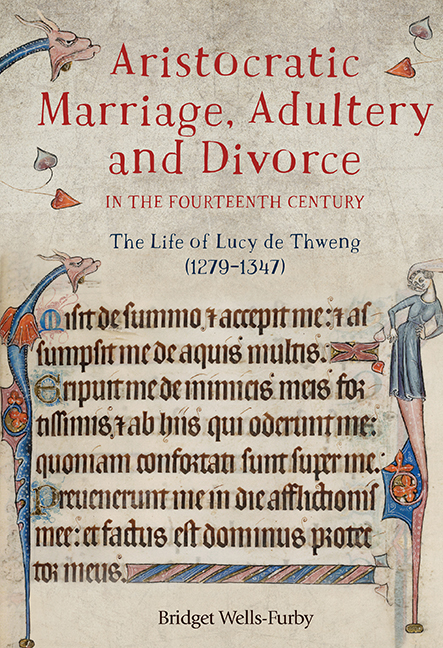 Aristocratic Marriage, Adultery and Divorce in the Fourteenth Century
Aristocratic Marriage, Adultery and Divorce in the Fourteenth Century Published online by Cambridge University Press: 04 April 2019
To understand the significance of Lucy's decision to have her marriage annulled, it is necessary to view it within the wider context of the theory and practice of marital breakdown within landholding families. It is clear that this was not uncommon, and was probably more common than might appear because the evidence that survives is largely incidental. It was often contained within the marriage bond but, when this was not possible, annulments might be sought by either party. The difficulties were immeasurably greater for the woman but nevertheless it would seem that annulments were initiated more frequently by wives than by husbands. Most of those who are known to have done so enjoyed at least one of two advantages, the security of their own title to land and the support of their own families, and Lucy had both of these. Both separations and annulments could have devastating consequences for the husband's estates and lineage but Lucy's decision to annul her marriage with Latimer had the least detrimental effect on him and their son.
The church's position on marriages that broke down was, first, to do everything it could to reconcile the parties, and only if this failed would it allow a judicial separation, the divorce ‘from table and bed’, under which the couple remained married but were not required to live together or to have sex with each other. This might be granted only on the grounds that the couple's differences were so serious that one of them was threatened with death. There was no place for the idea that any lesser personal differences might be grounds for a separation, and certainly not for a termination of the marriage altogether. A marriage might be terminated only because it was proved to have never been valid in the first place, on the grounds of one of the impediments.
Separations and annulments were sought by both husbands and wives but the difficulties and consequences were potentially far more serious for a wife than for a husband. This was so, whether she was rejected by her husband and expelled from his household, or whether she chose to leave him, either driven away by his treatment of her or drawn away by another relationship.
To save this book to your Kindle, first ensure no-reply@cambridge.org is added to your Approved Personal Document E-mail List under your Personal Document Settings on the Manage Your Content and Devices page of your Amazon account. Then enter the ‘name’ part of your Kindle email address below. Find out more about saving to your Kindle.
Note you can select to save to either the @free.kindle.com or @kindle.com variations. ‘@free.kindle.com’ emails are free but can only be saved to your device when it is connected to wi-fi. ‘@kindle.com’ emails can be delivered even when you are not connected to wi-fi, but note that service fees apply.
Find out more about the Kindle Personal Document Service.
To save content items to your account, please confirm that you agree to abide by our usage policies. If this is the first time you use this feature, you will be asked to authorise Cambridge Core to connect with your account. Find out more about saving content to Dropbox.
To save content items to your account, please confirm that you agree to abide by our usage policies. If this is the first time you use this feature, you will be asked to authorise Cambridge Core to connect with your account. Find out more about saving content to Google Drive.